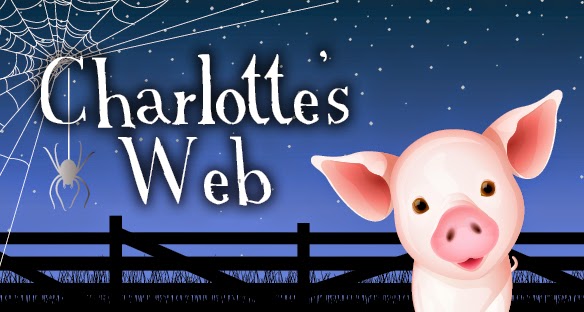“[Charlotte’s Web is about] friendship on earth, affection and protection, adventure and miracle, life and death, trust and treachery, pleasure and pain, and the passing of time. As a piece of work, it is just about perfect, and just about magical in the way it is done.”
–Eudora Welty, The New York Times Book Review
Nursed to health by Fern with bottles of milk, Wilbur soon goes to live on her Uncle Homer’s farm, where he grows up surrounded by a lively barnyard full of animals.
His motley crew of friends includes a scheming rat named Templeton, a prim and proper Goose and Gander, an ancient Sheep, and Charlotte, a wise, barnyard spider who concocts a brilliant plan to spin words into her web to save Wilbur’s life.
Seeing a series of incredible words—“Some Pig,” “Terrific,” and “Radiant”—written in Charlotte’s web, Uncle Homer declares them a miracle and takes his special pig to the County Fair to compete for a blue ribbon. If Wilbur wins, Homer promises that he’ll live a long and happy life, but he’ll need Charlotte’s help to make it happen.
Director Laurie Woolery returns to South Coast Repertory to direct Joseph Robinette’s stage adaptation of this classic, heart-warming tale of love, friendship and life on a farm.
“SCR is my artistic home,” Woolery says. “Just as Fern has a coming of age in Charlotte’s Web, I had my own coming of age here.”
Woolery got her start in theatre through SCR’s Theatre Conservatory program in 1989, Where she served as director of the conservatory from 1999 to 2005. She wrote and directed many shows for SCR’s conservatory and went on to serve as the associate artistic director of Cornerstone Theatre in Los Angeles. She is currently the associate director of public works at the Public Theatre in New York City.
 |
| Costume renderings for Templeton, Wilbur and Charlotte by designer Soojin Lee |
E. B. White—His Life, Work and Inspiration
E. B. White, the author of such beloved children's classics as Charlotte's Web, Stuart Little and The Trumpet of the Swan, was born in Mount Vernon, New York. He graduated from Cornell University in 1921 and, five or six years later, joined the staff of The New Yorker magazine. White authored seventeen books of prose and poetry and was elected to the American Academy of Arts and Letters in 1973.
In addition to writing children's books, White also wrote books for adults, as well as poems and essays, and he drew sketches for The New Yorker magazine. Some of his other books include: One Man's Meat, The Second Tree from the Corner, Letters of E. B. White, The Essays of E. B. White and Poems and Sketches of E. B. White.
Funnily enough for such a famous writer, he always said that he found writing difficult and bad for one's disposition but he kept at it!
 |
| “All that I hope to say in books, all that I ever hope to say, is that I love the world.” —E. B. White |
During his lifetime, many young readers asked Mr. White if his stories were true. In a letter written to be sent to his fans, he answered, “No, they are imaginary tales… But real life is only one kind of life—there is also the life of the imagination.”
White lived on a farm in Maine where he kept animals; some of these creatures made their way into his stories and books, like Stuart in Stuart Little, or Charlotte in Charlotte's Web. White said, “I like animals, and my barn is a very pleasant place to be, at all hours!”
White said of his inspiration for Charlotte’s Web: “I had been watching a big grey spider at her work and was impressed by how clever she was at weaving. Gradually I worked the spider into the story that you know, a story of friendship and salvation on a farm.”
Source: http://www.scholastic.com/teachers/contributor/e-b-white
Learn more and buy tickets.














